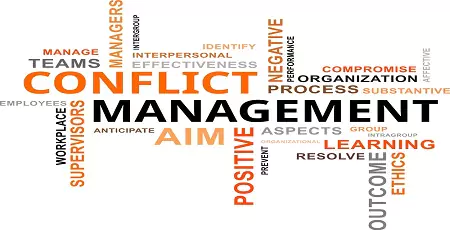Course Curriculum
Course Content
- Five Methods for Managing Conflict. Conflict has many sources in the workplace. ...
- Accommodation. This is a lose/win situation. ...
- Compromise. This is a win/lose – win/lose situation, i.e. everyone involved gains and loses through negotiation and flexibility. ...
- Avoidance. ...
- Competition. ...
- Collaboration. ...
- Related Items.
- Be aware. Conflict can arise at any time. ...
- Be proactive. Prevention and early resolution are the most effective. ...
- Seek to understand all sides of the issue. ...
- Initiate dialogue. ...
- Know when to ask for help. ...
- Assess your options. ...
- Take action. ...
- Reflect on the situation.
The key to conflict resolution is the three Rs: recognize the conflict, respond to the conflict, and resolve the conflict. When we learn to recognize our conflict reactions, every professional can respond in a way that transforms the situation
When looking to resolve team conflict, look for the 4 A s: acknowledge, accept, appreciate, and apologize. Acknowledge that a problem or conflict exists
From these approaches come five modes or styles of conflict management:
- Accommodating. An accommodating mode of conflict management tends to be high in cooperation but low in assertiveness. ...
- Avoiding. When avoiding, you try to dodge or bypass a conflict. ...
- Collaborating. ...
- Competing. ...
- Compromising.
Quick Enquiry
Exam & Certification
Remember these three steps and you will be well on your way to thoroughly impressing your interviewer:
- Context: Describe the workplace issue briefly and set the scene for a relevant example.
- Action: Explain the actions you took to address the conflict.
- Result: Detail the outcome of your action.
Situation: Briefly explain the issue you were dealing with in a positive, constructive way. Task: Describe your role in the situation.
Action: Discuss what you did to resolve or address the situation. Result: Emphasize what you learned and how your actions had a positive outcome
Testimonials
Conflict Management FAQ's
During this one-day course, a variety of topics will be covered with the aim of educating you on conflict management and effective communication. The following are the practical skills you’ll gain on course completion:
- Understanding why conflicts arise
- Identifying common responses to conflicts in terms of behavior, thoughts, and attitude
- Exploring Aggressive, Passive and Assertive approaches and the consequence of each response
- Deal with difficult team members
- Learning effective conflict resolution methods and best practices for managing conflicts
- Building trust and credibility with colleagues and team members
- Holding difficult conversations calmly and assertively
- Entrepreneurs
- Business Leaders
- Portfolio Managers
- Program Managers
- Project Managers
- Team Leaders
- Executives
- Supervisors
- Union Leaders
All those who want to be more successful in working with others and resolving team conflicts will benefit from this course.
There are no prerequisites to attend this course.

.webp)
.webp)


